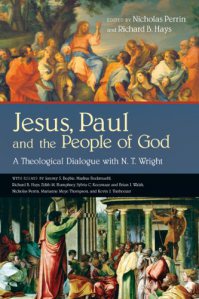Jesus, Paul and the People of God: A Theological Dialogue with N. T. Wright, reviewed by Amos Yong
 Nicholas Perrin and Richard B. Hays, eds., Jesus, Paul and the People of God: A Theological Dialogue with N. T. Wright (Downers Grove: InterVarsity Press, 2011), 294 pages.
Nicholas Perrin and Richard B. Hays, eds., Jesus, Paul and the People of God: A Theological Dialogue with N. T. Wright (Downers Grove: InterVarsity Press, 2011), 294 pages.
Every time I read N. T. Wright I come away edified, instructed, inspired, and even transformed. This book is no exception. As in much if not all of his other work (I am reluctant to be emphatic about the all since I do not want to give the misleading impression that I have read all of Wright’s books—I do not think that I will live long enough to do that, especially since the former bishop of Durham writes books faster than I can read!), Jesus is lifted up; the benefit of this book is that we also get a glimpse of how Wright sees St. Paul lifting Jesus up as well. Let me explain through a cursory overview of the two parts of this book.
As a product of the nineteenth annual Wheaton Theology Conference (at Wheaton College in Wheaton, Illinois) held in April 2010, the volume features eight chapters responding to the work of the newly appointed chair of New Testament and Early Christianity at the University of St. Andrews. Half engage Wright’s focus on Jesus (in part I) while the other half interact with Wright’s understanding of Paul (part II). Each chapter includes a brief rejoinder by Wright at the end, while each part concludes with a lengthier reflection by Wright on whither historical Jesus and whither Pauline studies in the life of the church, respectively (in part I on Jesus, quite a bit lengthier—about 45 pages worth, the longest chapter of the book). To be sure, the conference organizers had to be selective in inviting respondents to Wright’s work, so the essayists engage Wright’s corpus from their respective vantage points.
Wright’s body of scholarship is slowly but surely initiating a paradigm change.
As Vanhoozer points out, Wright’s body of scholarship is slowly but surely initiating a paradigm change, not just in historical Jesus or historical Paul scholarship but also in the fields of New Testament Studies and even of historical, dogmatic/doctrinal, and systematic theology. Of course, this is happening in tandem with other developments such as postliberal theology and the New Perspective on Paul initiatives, the latter especially to which Wright has made his own substantive, even if also critical, contributions. The result, methodologically, is a sure-footed via media between conservativism and liberalism, between orthodoxy and historicism, between modernism and postmodernism, between biblical theology and theological interpretation, etc. More importantly, it is precisely in and through a careful rereading of the New Testament in particular and the biblical canon as a whole that Wright is forging a fresh understanding of the Gospel in Jesus Christ as it relates to God’s election of Israel, to the formation of the church as new people of God in relationship to the restoration of Israel, and to the mission of the people of God in the present time. To be sure, there will be detractors a plenty given all of the ground covered across the Wrightian corpus, but even if he is only half right, there are many implications for what that means for faithful Christian discipleship in our present time. (And again, even if Wright is only half right, there will be even more implications to be discerned from out of the process of correcting his proposals.)
Category: In Depth, Pneuma Review, Spring 2012


